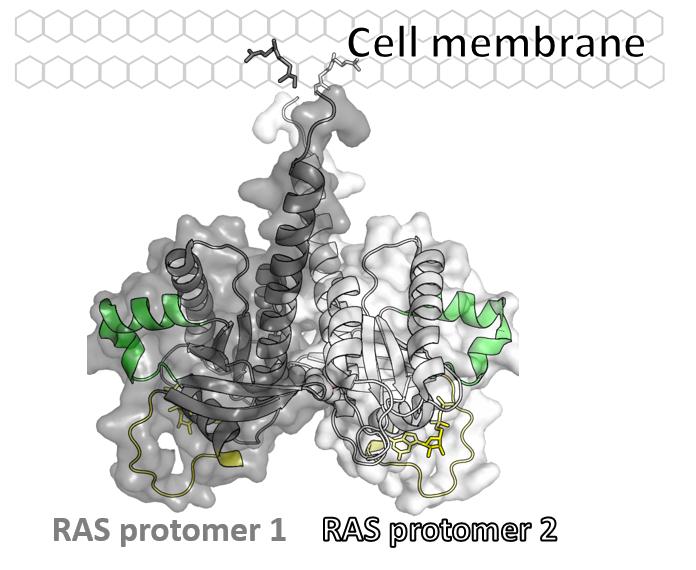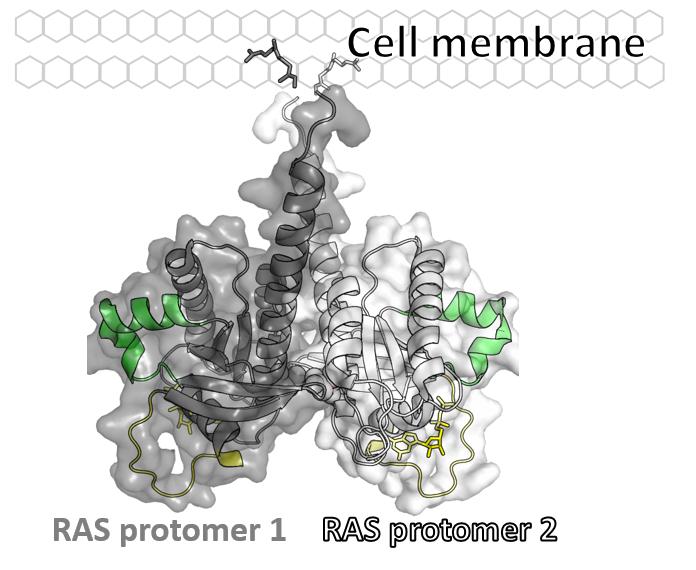
Credit: UT Southwestern
DALLAS – Jan. 11, 2018 – Mutated RAS genes are some of the most common genetic drivers of cancer, especially in aggressive cancers like pancreatic and lung cancer, but no medicines that target RAS are available despite decades of effort.
Researchers at UT Southwestern's Simmons Cancer Center have shown that RAS molecules act in pairs, known as dimers, to cause cancer, findings that could help guide them to a treatment.
"RAS mutations are one of the most common causes of cancer and there are no options for attacking them. The dimerization activity of RAS gives us a solid lead for moving forward," said Dr. Kenneth Westover, Assistant Professor of Radiation Oncology and Biochemistry with the Harold C. Simmons Comprehensive Cancer Center at UT Southwestern Medical Center, which is recognizing its 75th anniversary this year.
The question of RAS dimerization has been hotly debated, he said, but researchers previously haven't been able to prove what RAS dimers look like, limiting the ability to design experiments that assess their importance in normal physiology and cancer. The UT Southwestern team led by Dr. Westover used X-ray crystallography data to predict what a RAS dimer might look like, then tested the model in cells using a method called fluorescence resonance energy transfer (FRET) to show when RAS forms dimers and when it does not.
The study, published in the journal Cell, provides a foundation for further studies that delve into RAS biology and could potentially pave the way to develop new cancer drugs that target RAS dimerization.
"The primary function of RAS is to transmit signals that tell a cell to grow and divide, a pathway commonly hijacked in cancer. What became clear in our studies is that RAS needs to dimerize to efficiently pass signals in cells. Moreover, RAS dimerization appears to be a crucial event for mutated forms of RAS to cause cancer," said Dr. Westover, part of the Simmons Lung Cancer Team.
Members of the Westover research lab teamed up with researchers from the Dana Farber Cancer Institute to show that RAS dimers are essential in a number of cancer cell systems and animal models of cancer.
###
This work was supported by The US Department of Defense, V Foundation for Cancer Research, and the Cancer Prevention and Research Institute of Texas.
The Harold C. Simmons Comprehensive Cancer Center is the only NCI-designated Comprehensive Cancer Center in North Texas and one of just 47 NCI-designated Comprehensive Cancer Centers in the nation. Simmons Cancer Center includes 13 major cancer care programs. In addition, the Center's education and training programs support and develop the next generation of cancer researchers and clinicians. Simmons Cancer Center is among only 30 U.S. cancer research centers to be designated by the NCI as a National Clinical Trials Network Lead Academic Participating Site.
About UT Southwestern Medical Center
UT Southwestern, one of the premier academic medical centers in the nation, integrates pioneering biomedical research with exceptional clinical care and education. The institution's faculty has received six Nobel Prizes, and includes 22 members of the National Academy of Sciences, 18 members of the National Academy of Medicine, and 14 Howard Hughes Medical Institute Investigators. The faculty of more than 2,700 is responsible for groundbreaking medical advances and is committed to translating science-driven research quickly to new clinical treatments. UT Southwestern physicians provide care in about 80 specialties to more than 100,000 hospitalized patients, 600,000 emergency room cases, and oversee approximately 2.2 million outpatient visits a year.
Media Contact
Cathy Frisinger
[email protected]
214-648-3404
@UTSWNews
http://www.swmed.edu
Original Source
http://www.utsouthwestern.edu/newsroom/articles/year-2018/ras-dimers.html





